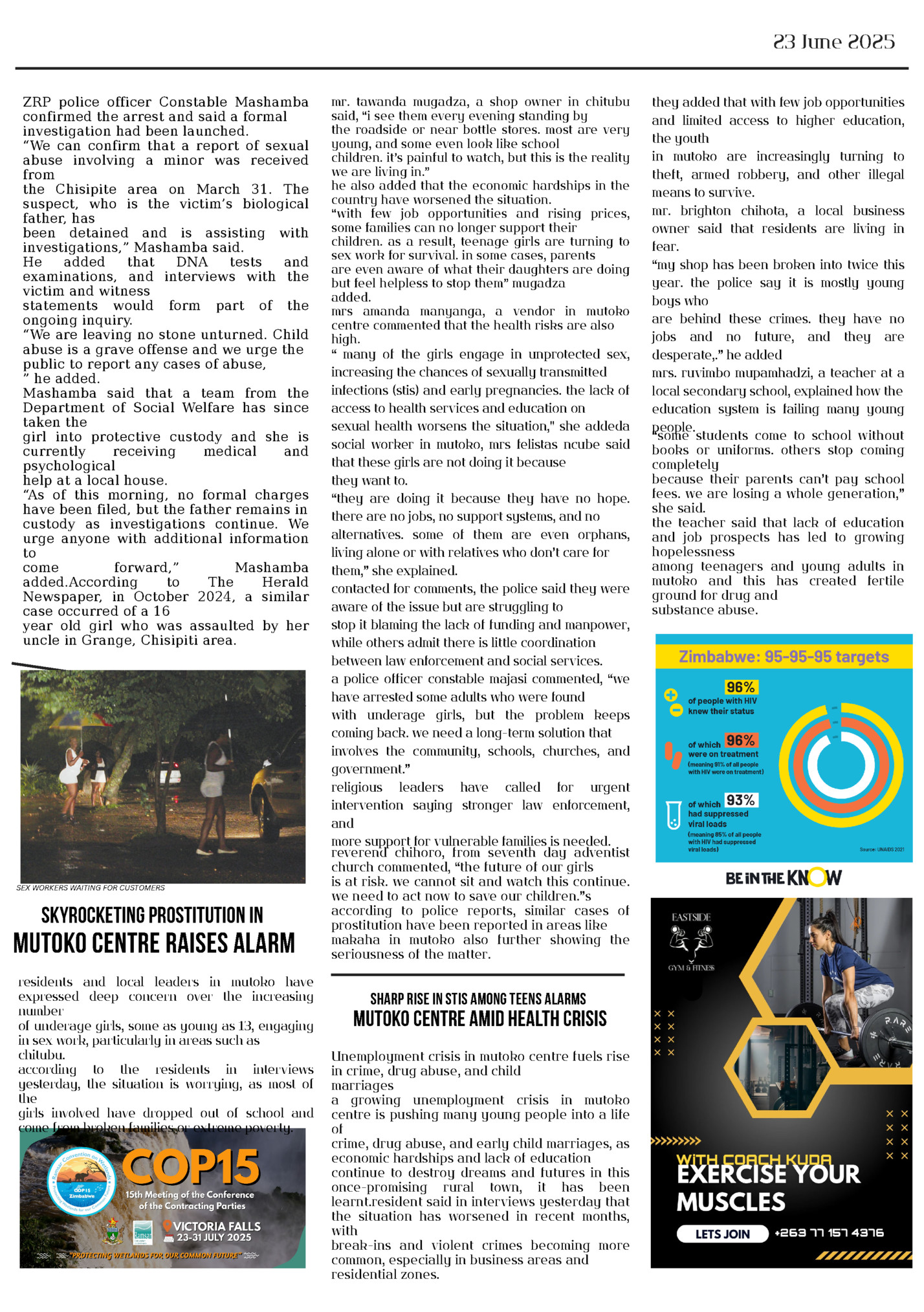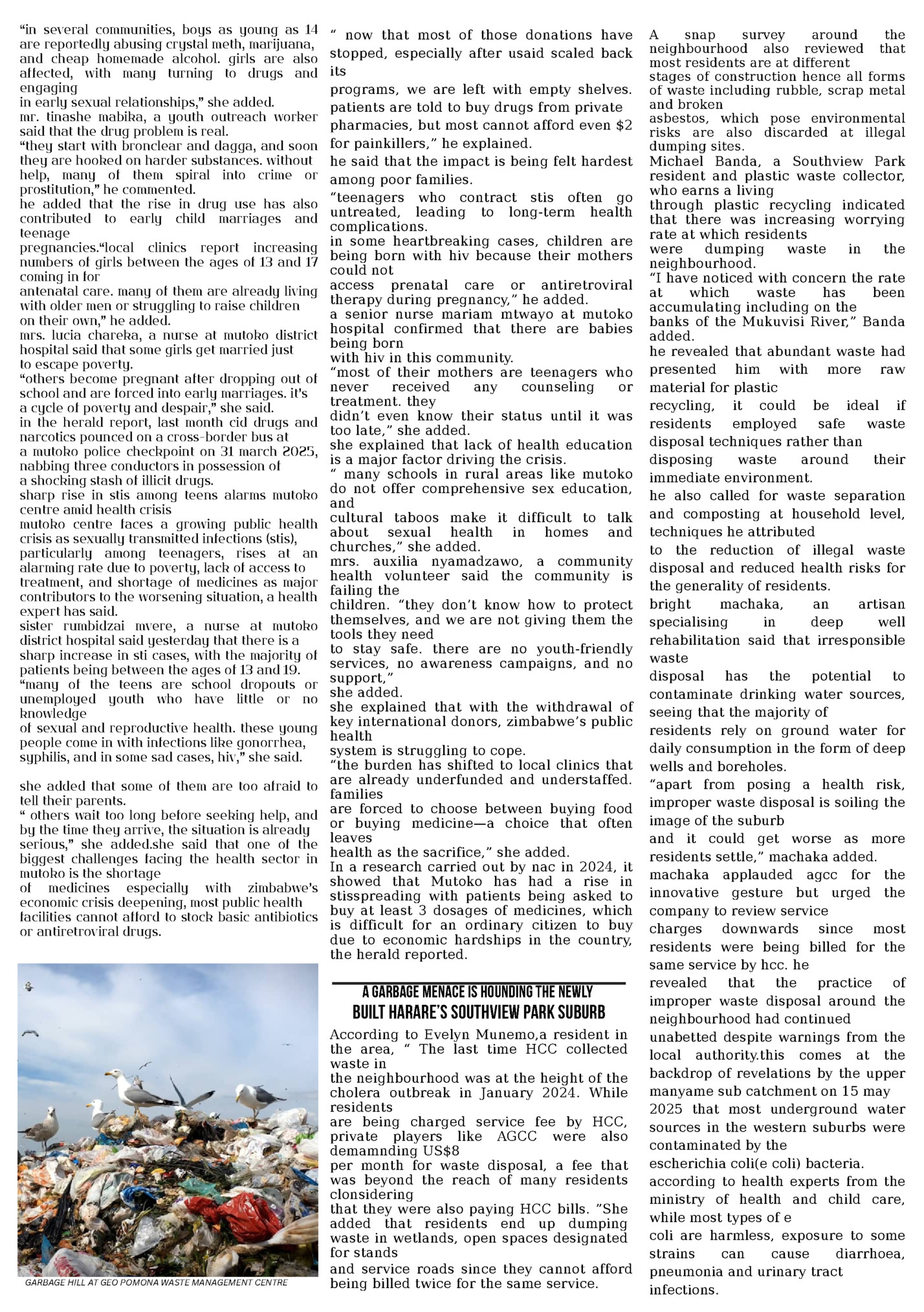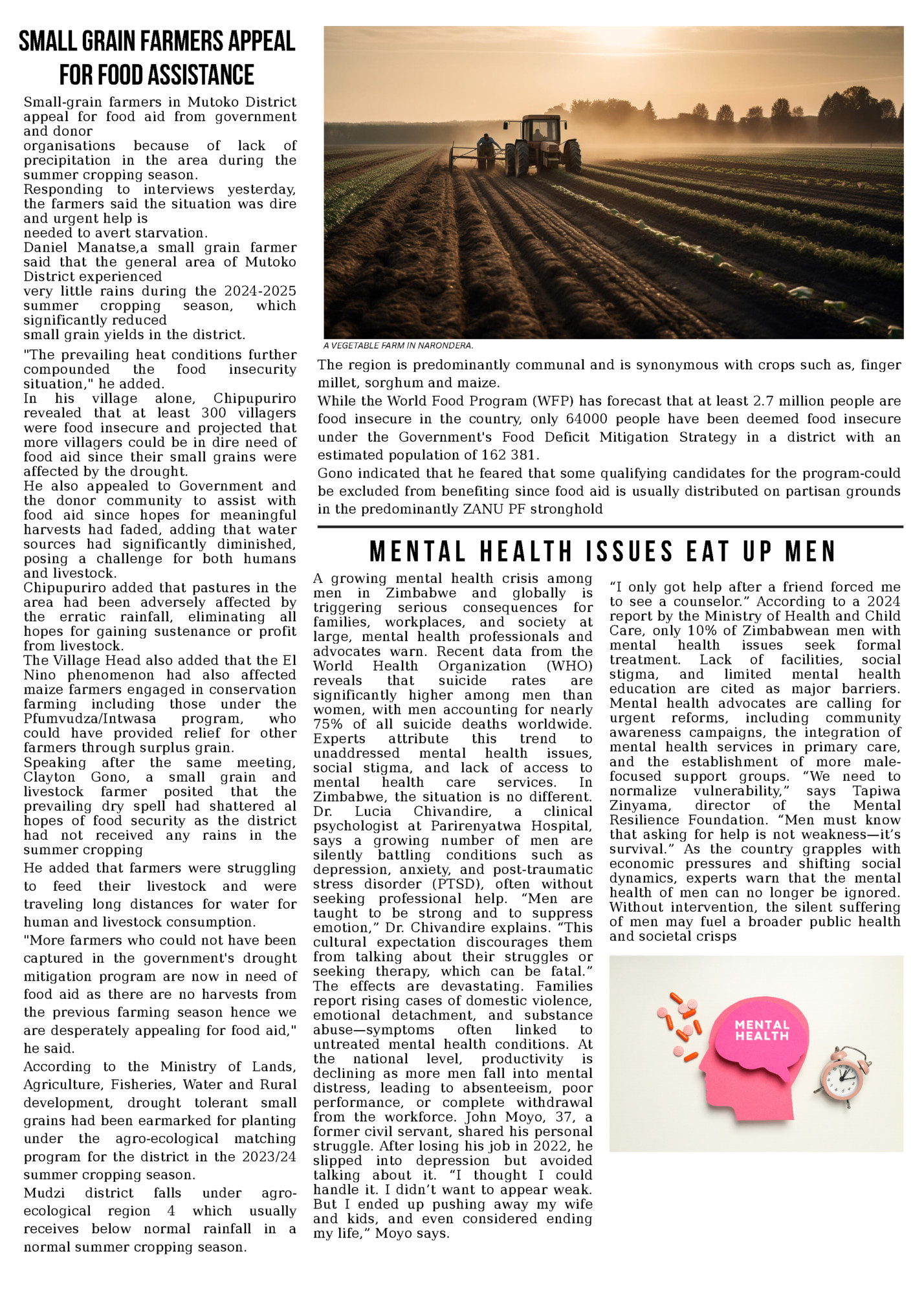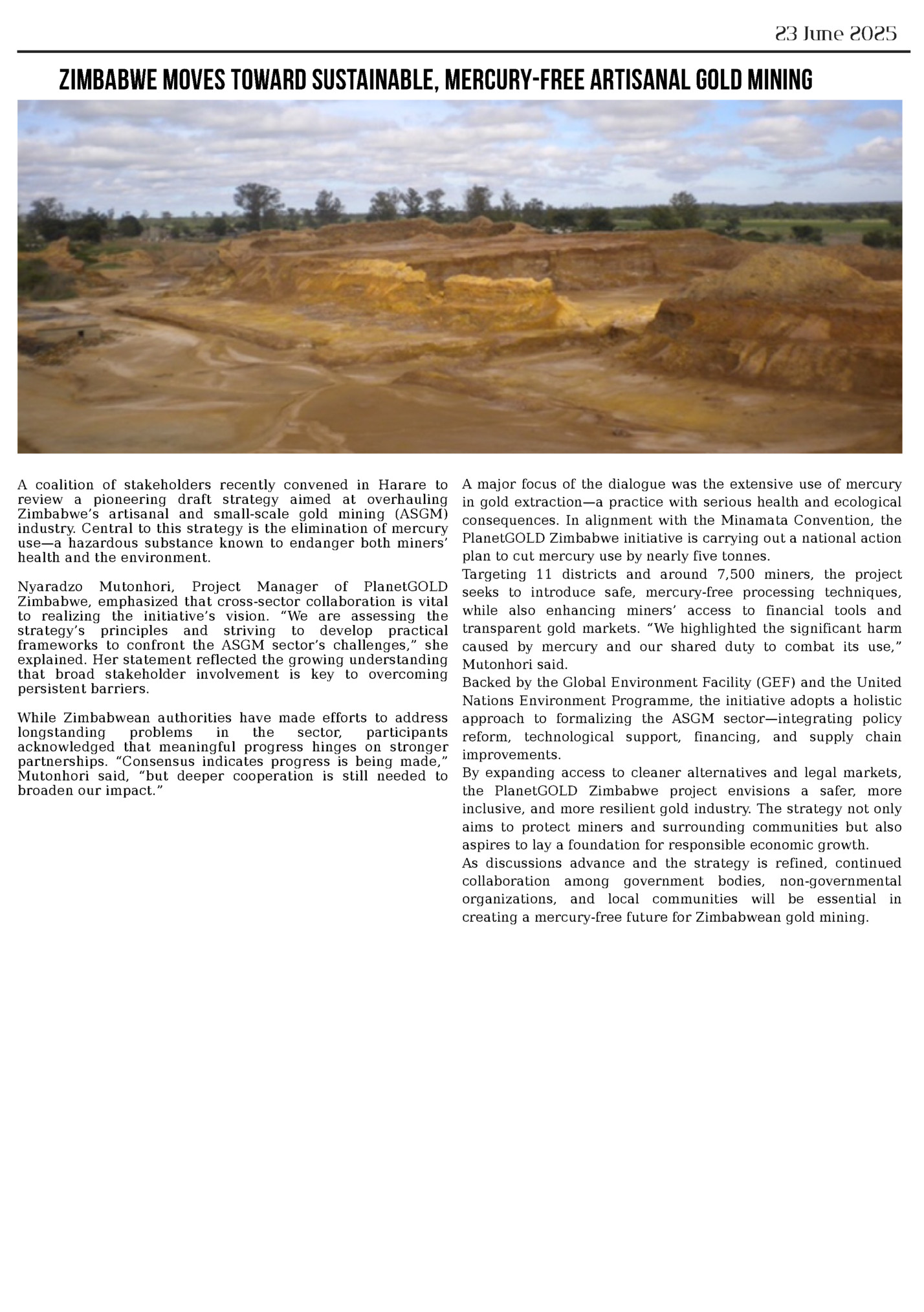MONDAY THE DAILY UPDATE STORIES BY ANESU MISHEL DURI BUGS INVADE THRIFT MARKET CUSTOMERS BUYING FROM A THRIFT CORNER IN MBARE HARARE, ZIMBABWE - A crisis is gripping Harare's thrift store industry, as citizens increasingly shun second-hand shops due to widespread reports of bug infestations in donated items. The crisis has sparked fears about public health, with many locals expressing concerns about the potential risks of contracting diseases and parasites from infested clothing and goods. According to sources, the problem is particularly acute in urban areas, where thrift stores are most concentrated. Residents are reportedly avoiding these stores, opting instead to purchase new items from supermarkets and other retailers. SEXUALLY ABUSED BY FATHER IN CHISIPITE, HARARE: POLICE INVESTIGATIONS UNDERWAY The girl said that the abuse lasted for a few minutes before her stepmother unexpectedly returned home, causing the father to stop and unlock the door. “I then ran out of the house and sought help from a neighbour, who immediately contacted the police and child protection services”, the child narrated.Then neighbour, who According to the child’s spoke on the condition of statement to authorities and anonymity said that she was social workers, the abuse took shaken by place shortly after she returned the girl’s condition and home from school. demeanor. The minor, whose identity is being withheld to protect her “She was crying hysterically identity, gave an account of the traumatising event in detail, and her clothes were tattered. describing how her father She kept saying, ‘He hurt me.’ I did not wait- I called the allegedly lured her into his bedroom under the pretense of police straight away,” said the wanting help to organise the neighbour. room. Police officers from Highland Police Station responded and “He told me to sit on the bed and arrested the 42-year-old started saying strange things. I man who is now being held in was confused”. He police custody pending further locked the door and started investigations. Authorities touching me. I told him to stop, have not yet released the but he said no one would believe me if I told anyone. I was suspect’s name to the public, due to the sensitive nature of so scare, ” the girl reportedly told the case and the need to protect investigators. the minor’s identity. A 13-year old girl from Chisipite Suburb in Harare has alleged that she was sexually abused by her father in a deeply disturbing case that has shocked the local community. The incident reportedly occurred yesterday afternoon inside the family home and has since sparked an urgent investigation by the Zimbabwe Republic Police (ZRP). DID YOU KNOW? Zimbabwe will be hosting COP 15 this year from the 23rd to the 31st of July in Victoria Falls. This event is a meeting of the contracting parties to discuss on how communities can preserve wetlands under the theme : Protecting wetlands for our common future.

ZRP police officer Constable Mashamba confirmed the arrest and said a formal investigation had been launched. “We can confirm that a report of sexual abuse involving a minor was received from the Chisipite area on March 31. The suspect, who is the victim’s biological father, has been detained and is assisting with investigations,” Mashamba said. He added that DNA tests and examinations, and interviews with the victim and witness statements would form part of the ongoing inquiry. “We are leaving no stone unturned. Child abuse is a grave offense and we urge the public to report any cases of abuse, ” he added. Mashamba said that a team from the Department of Social Welfare has since taken the girl into protective custody and she is currently receiving medical and psychological help at a local house. “As of this morning, no formal charges have been filed, but the father remains in custody as investigations continue. We urge anyone with additional information to come forward,” Mashamba added.According to The Herald Newspaper, in October 2024, a similar case occurred of a 16 year old girl who was assaulted by her uncle in Grange, Chisipiti area. SEX WORKERS WAITING FOR CUSTOMERS SKYROCKETING PROSTITUTION IN MUTOKO CENTRE RAISES ALARM residents and local leaders in mutoko have expressed deep concern over the increasing number of underage girls, some as young as 13, engaging in sex work, particularly in areas such as chitubu. according to the residents in interviews yesterday, the situation is worrying, as most of the girls involved have dropped out of school and come from broken families or extreme poverty. mr. tawanda mugadza, a shop owner in chitubu said, “i see them every evening standing by the roadside or near bottle stores. most are very young, and some even look like school children. it’s painful to watch, but this is the reality we are living in.” he also added that the economic hardships in the country have worsened the situation. “with few job opportunities and rising prices, some families can no longer support their children. as a result, teenage girls are turning to sex work for survival. in some cases, parents are even aware of what their daughters are doing but feel helpless to stop them” mugadza added. mrs amanda manyanga, a vendor in mutoko centre commented that the health risks are also high. “ many of the girls engage in unprotected sex, increasing the chances of sexually transmitted infections (stis) and early pregnancies. the lack of access to health services and education on sexual health worsens the situation," she addeda social worker in mutoko, mrs felistas ncube said that these girls are not doing it because they want to. “they are doing it because they have no hope. there are no jobs, no support systems, and no alternatives. some of them are even orphans, living alone or with relatives who don’t care for them,” she explained. contacted for comments, the police said they were aware of the issue but are struggling to stop it blaming the lack of funding and manpower, while others admit there is little coordination between law enforcement and social services. a police officer constable majasi commented, “we have arrested some adults who were found with underage girls, but the problem keeps coming back. we need a long-term solution that involves the community, schools, churches, and government.” religious leaders have called for urgent intervention saying stronger law enforcement, and more support for vulnerable families is needed. reverend chihoro, from seventh day adventist church commented, “the future of our girls is at risk. we cannot sit and watch this continue. we need to act now to save our children.”s according to police reports, similar cases of prostitution have been reported in areas like makaha in mutoko also further showing the seriousness of the matter. Sharp Rise in STIs Among Teens Alarms Mutoko Centre Amid Health Crisis Unemployment crisis in mutoko centre fuels rise in crime, drug abuse, and child marriages a growing unemployment crisis in mutoko centre is pushing many young people into a life of crime, drug abuse, and early child marriages, as economic hardships and lack of education continue to destroy dreams and futures in this once-promising rural town, it has been learnt.resident said in interviews yesterday that the situation has worsened in recent months, with break-ins and violent crimes becoming more common, especially in business areas and residential zones. they added that with few job opportunities and limited access to higher education, the youth in mutoko are increasingly turning to theft, armed robbery, and other illegal means to survive. mr. brighton chihota, a local business owner said that residents are living in fear. “my shop has been broken into twice this year. the police say it is mostly young boys who are behind these crimes. they have no jobs and no future, and they are desperate,.” he added mrs. ruvimbo mupamhadzi, a teacher at a local secondary school, explained how the education system is failing many young people. “some students come to school without books or uniforms. others stop coming completely because their parents can’t pay school fees. we are losing a whole generation,” she said. the teacher said that lack of education and job prospects has led to growing hopelessness among teenagers and young adults in mutoko and this has created fertile ground for drug and substance abuse.

are reportedly abusing crystal meth, marijuana, and cheap homemade alcohol. girls are also affected, with many turning to drugs and engaging in early sexual relationships,” she added. mr. tinashe mabika, a youth outreach worker said that the drug problem is real. “they start with bronclear and dagga, and soon they are hooked on harder substances. without help, many of them spiral into crime or prostitution,” he commented. he added that the rise in drug use has also contributed to early child marriages and teenage pregnancies.“local clinics report increasing numbers of girls between the ages of 13 and 17 coming in for antenatal care. many of them are already living with older men or struggling to raise children on their own,” he added. mrs. lucia chareka, a nurse at mutoko district hospital said that some girls get married just to escape poverty. “others become pregnant after dropping out of school and are forced into early marriages. it’s a cycle of poverty and despair,” she said. in the herald report, last month cid drugs and narcotics pounced on a cross-border bus at a mutoko police checkpoint on 31 march 2025, nabbing three conductors in possession of a shocking stash of illicit drugs. sharp rise in stis among teens alarms mutoko centre amid health crisis mutoko centre faces a growing public health crisis as sexually transmitted infections (stis), particularly among teenagers, rises at an alarming rate due to poverty, lack of access to treatment, and shortage of medicines as major contributors to the worsening situation, a health expert has said. sister rumbidzai mvere, a nurse at mutoko district hospital said yesterday that there is a sharp increase in sti cases, with the majority of patients being between the ages of 13 and 19. “many of the teens are school dropouts or unemployed youth who have little or no knowledge of sexual and reproductive health. these young people come in with infections like gonorrhea, syphilis, and in some sad cases, hiv,” she said. she added that some of them are too afraid to tell their parents. “ others wait too long before seeking help, and by the time they arrive, the situation is already serious,” she added.she said that one of the biggest challenges facing the health sector in mutoko is the shortage of medicines especially with zimbabwe’s economic crisis deepening, most public health facilities cannot afford to stock basic antibiotics or antiretroviral drugs. “ now that most of those donations have stopped, especially after usaid scaled back its programs, we are left with empty shelves. patients are told to buy drugs from private pharmacies, but most cannot afford even $2 for painkillers,” he explained. he said that the impact is being felt hardest among poor families. “teenagers who contract stis often go untreated, leading to long-term health complications. in some heartbreaking cases, children are being born with hiv because their mothers could not access prenatal care or antiretroviral therapy during pregnancy,” he added. a senior nurse mariam mtwayo at mutoko hospital confirmed that there are babies being born with hiv in this community. “most of their mothers are teenagers who never received any counseling or treatment. they didn’t even know their status until it was too late,” she added. she explained that lack of health education is a major factor driving the crisis. “ many schools in rural areas like mutoko do not offer comprehensive sex education, and cultural taboos make it difficult to talk about sexual health in homes and churches,” she added. mrs. auxilia nyamadzawo, a community health volunteer said the community is failing the children. “they don’t know how to protect themselves, and we are not giving them the tools they need to stay safe. there are no youth-friendly services, no awareness campaigns, and no support,” she added. she explained that with the withdrawal of key international donors, zimbabwe’s public health system is struggling to cope. “the burden has shifted to local clinics that are already underfunded and understaffed. families are forced to choose between buying food or buying medicine—a choice that often leaves health as the sacrifice,” she added. In a research carried out by nac in 2024, it showed that Mutoko has had a rise in stisspreading with patients being asked to buy at least 3 dosages of medicines, which is difficult for an ordinary citizen to buy due to economic hardships in the country, the herald reported. A GARBAGE MENACE IS HOUNDING THE NEWLY BUILT HARARE’S SOUTHVIEW PARK SUBURB GARBAGE HILL AT GEO POMONA WASTE MANAGEMENT CENTRE According to Evelyn Munemo,a resident in the area, “ The last time HCC collected waste in the neighbourhood was at the height of the cholera outbreak in January 2024. While residents are being charged service fee by HCC, private players like AGCC were also demamnding US$8 per month for waste disposal, a fee that was beyond the reach of many residents clonsidering that they were also paying HCC bills. ”She added that residents end up dumping waste in wetlands, open spaces designated for stands and service roads since they cannot afford being billed twice for the same service. A snap survey around the neighbourhood also reviewed that most residents are at different stages of construction hence all forms of waste including rubble, scrap metal and broken asbestos, which pose environmental risks are also discarded at illegal dumping sites. Michael Banda, a Southview Park resident and plastic waste collector, who earns a living through plastic recycling indicated that there was increasing worrying rate at which residents were dumping waste in the neighbourhood. “I have noticed with concern the rate at which waste has been accumulating including on the banks of the Mukuvisi River,” Banda added. he revealed that abundant waste had presented him with more raw material for plastic recycling, it could be ideal if residents employed safe waste disposal techniques rather than disposing waste around their immediate environment. he also called for waste separation and composting at household level, techniques he attributed to the reduction of illegal waste disposal and reduced health risks for the generality of residents. bright machaka, an artisan specialising in deep well rehabilitation said that irresponsible waste disposal has the potential to contaminate drinking water sources, seeing that the majority of residents rely on ground water for daily consumption in the form of deep wells and boreholes. “apart from posing a health risk, improper waste disposal is soiling the image of the suburb and it could get worse as more residents settle,” machaka added. machaka applauded agcc for the innovative gesture but urged the company to review service charges downwards since most residents were being billed for the same service by hcc. he revealed that the practice of improper waste disposal around the neighbourhood had continued unabetted despite warnings from the local authority.this comes at the backdrop of revelations by the upper manyame sub catchment on 15 may 2025 that most underground water sources in the western suburbs were contaminated by the escherichia coli(e coli) bacteria. according to health experts from the ministry of health and child care, while most types of e coli are harmless, exposure to some strains can cause diarrhoea, pneumonia and urinary tract infections.

FOR FOOD ASSISTANCE Small-grain farmers in Mutoko District appeal for food aid from government and donor organisations because of lack of precipitation in the area during the summer cropping season. Responding to interviews yesterday, the farmers said the situation was dire and urgent help is needed to avert starvation. Daniel Manatse,a small grain farmer said that the general area of Mutoko District experienced very little rains during the 2024-2025 summer cropping season, which significantly reduced small grain yields in the district. "The prevailing heat conditions further compounded the food insecurity situation," he added. In his village alone, Chipupuriro revealed that at least 300 villagers were food insecure and projected that more villagers could be in dire need of food aid since their small grains were affected by the drought. He also appealed to Government and the donor community to assist with food aid since hopes for meaningful harvests had faded, adding that water sources had significantly diminished, posing a challenge for both humans and livestock. Chipupuriro added that pastures in the area had been adversely affected by the erratic rainfall, eliminating all hopes for gaining sustenance or profit from livestock. The Village Head also added that the El Nino phenomenon had also affected maize farmers engaged in conservation farming including those under the Pfumvudza/Intwasa program, who could have provided relief for other farmers through surplus grain. Speaking after the same meeting, Clayton Gono, a small grain and livestock farmer posited that the prevailing dry spell had shattered al hopes of food security as the district had not received any rains in the summer cropping He added that farmers were struggling to feed their livestock and were traveling long distances for water for human and livestock consumption. "More farmers who could not have been captured in the government's drought mitigation program are now in need of food aid as there are no harvests from the previous farming season hence we are desperately appealing for food aid," he said. According to the Ministry of Lands, Agriculture, Fisheries, Water and Rural development, drought tolerant small grains had been earmarked for planting under the agro-ecological matching program for the district in the 2023/24 summer cropping season. Mudzi district falls under agroecological region 4 which usually receives below normal rainfall in a normal summer cropping season. A VEGETABLE FARM IN NARONDERA. The region is predominantly communal and is synonymous with crops such as, finger millet, sorghum and maize. While the World Food Program (WFP) has forecast that at least 2.7 million people are food insecure in the country, only 64000 people have been deemed food insecure under the Government's Food Deficit Mitigation Strategy in a district with an estimated population of 162 381. Gono indicated that he feared that some qualifying candidates for the program-could be excluded from benefiting since food aid is usually distributed on partisan grounds in the predominantly ZANU PF stronghold M e n ta l H e a lt h i s s u e s e at u p m e n A growing mental health crisis among men in Zimbabwe and globally is triggering serious consequences for families, workplaces, and society at large, mental health professionals and advocates warn. Recent data from the World Health Organization (WHO) reveals that suicide rates are significantly higher among men than women, with men accounting for nearly 75% of all suicide deaths worldwide. Experts attribute this trend to unaddressed mental health issues, social stigma, and lack of access to mental health care services. In Zimbabwe, the situation is no different. Dr. Lucia Chivandire, a clinical psychologist at Parirenyatwa Hospital, says a growing number of men are silently battling conditions such as depression, anxiety, and post-traumatic stress disorder (PTSD), often without seeking professional help. “Men are taught to be strong and to suppress emotion,” Dr. Chivandire explains. “This cultural expectation discourages them from talking about their struggles or seeking therapy, which can be fatal.” The effects are devastating. Families report rising cases of domestic violence, emotional detachment, and substance abuse—symptoms often linked to untreated mental health conditions. At the national level, productivity is declining as more men fall into mental distress, leading to absenteeism, poor performance, or complete withdrawal from the workforce. John Moyo, 37, a former civil servant, shared his personal struggle. After losing his job in 2022, he slipped into depression but avoided talking about it. “I thought I could handle it. I didn’t want to appear weak. But I ended up pushing away my wife and kids, and even considered ending my life,” Moyo says. “I only got help after a friend forced me to see a counselor.” According to a 2024 report by the Ministry of Health and Child Care, only 10% of Zimbabwean men with mental health issues seek formal treatment. Lack of facilities, social stigma, and limited mental health education are cited as major barriers. Mental health advocates are calling for urgent reforms, including community awareness campaigns, the integration of mental health services in primary care, and the establishment of more malefocused support groups. “We need to normalize vulnerability,” says Tapiwa Zinyama, director of the Mental Resilience Foundation. “Men must know that asking for help is not weakness—it’s survival.” As the country grapples with economic pressures and shifting social dynamics, experts warn that the mental health of men can no longer be ignored. Without intervention, the silent suffering of men may fuel a broader public health and societal crisps

ZIMBABWE MOVES TOWARD SUSTAINABLE, MERCURY-FREE ARTISANAL GOLD MINING A coalition of stakeholders recently convened in Harare to review a pioneering draft strategy aimed at overhauling Zimbabwe’s artisanal and small-scale gold mining (ASGM) industry. Central to this strategy is the elimination of mercury use—a hazardous substance known to endanger both miners’ health and the environment. Nyaradzo Mutonhori, Project Manager of PlanetGOLD Zimbabwe, emphasized that cross-sector collaboration is vital to realizing the initiative’s vision. “We are assessing the strategy’s principles and striving to develop practical frameworks to confront the ASGM sector’s challenges,” she explained. Her statement reflected the growing understanding that broad stakeholder involvement is key to overcoming persistent barriers. While Zimbabwean authorities have made efforts to address longstanding problems in the sector, participants acknowledged that meaningful progress hinges on stronger partnerships. “Consensus indicates progress is being made,” Mutonhori said, “but deeper cooperation is still needed to broaden our impact.” A major focus of the dialogue was the extensive use of mercury in gold extraction—a practice with serious health and ecological consequences. In alignment with the Minamata Convention, the PlanetGOLD Zimbabwe initiative is carrying out a national action plan to cut mercury use by nearly five tonnes. Targeting 11 districts and around 7,500 miners, the project seeks to introduce safe, mercury-free processing techniques, while also enhancing miners’ access to financial tools and transparent gold markets. “We highlighted the significant harm caused by mercury and our shared duty to combat its use,” Mutonhori said. Backed by the Global Environment Facility (GEF) and the United Nations Environment Programme, the initiative adopts a holistic approach to formalizing the ASGM sector—integrating policy reform, technological support, financing, and supply chain improvements. By expanding access to cleaner alternatives and legal markets, the PlanetGOLD Zimbabwe project envisions a safer, more inclusive, and more resilient gold industry. The strategy not only aims to protect miners and surrounding communities but also aspires to lay a foundation for responsible economic growth. As discussions advance and the strategy is refined, continued collaboration among government bodies, non-governmental organizations, and local communities will be essential in creating a mercury-free future for Zimbabwean gold mining.

Fleepit Digital © 2021